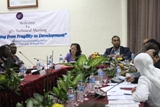Technical Meeting of the g7+ Countries

On 24 August 2011, Timor-Leste’s Ministry of Finance held a high-level meeting with the g7+ member countries on the sidelines of the Extractive Industries Transparency Initiative (EITI) Regional Conference held in Dili, Timor-Leste from 25-27 August 2011. Representatives from the Democratic Republic of Congo, the Solomon Islands, the Republic of Burundi, the Republic of Liberia, Guinea-Bissau, the Federal Democratic Republic of Nepal, the Islamic Republic of Afghanistan and the Central African of Republic were among the meeting’s participants. Representatives from the OECD and International Dialogue on Peacebuilding and Statebuilding Secretariat also observed the meeting.
Olivier Kamitatu, Minister of National Planning from the Democratic Republic of Congo and Gordon Darcy Lilo, Minister of State for Planning and International Cooperation from Solomon Islands were amongst several Ministers in attendance.
On behalf of the Prime Minister Xanana Gusmão, H.E. José Luís Guterres provided a warm welcome to distinguished delegates of g7+ and pledged the Government’s support to the g7+.
During the meeting chaired by Emilia Pires, Minister of Finance and Chair of the g7+, member countries came together to share experiences on their peacebuilding and statebuilding efforts. Additionally, members offered suggestions of how to include the voice of civil society and opposition groups in political dialogue and how to ensure fragile states can maintain ownership of the aid provided to their countries.
During the meeting Minister Pires briefed participants on the history of the g7+, significant milestones and what was yet to be accomplished in the lead up to the 4th High Level Forum (HLF4) in Busan, South Korea. It is at the HLF4 where the g7+ seeks to draw attention to the specific needs of fragile states through the unveiling of a set of peacebuilding and statebuilding goals as prerequisites to achieving the MDGs.
Minister Pires described the MDGs as important tools to coordinate development assistance, but argued that they have had relatively little success in contexts of fragility. This is largely because the MDGs are too focused on improving the lives of individuals, with the presumption of strong State institutions and an absence of conflict, which, in reality, rarely exists in conflict affected states. It is due to this fact that the g7+ countries have agreed to work in partnership with the International Dialogue on Peacebuilding and Statebuidling to develop a set of Peacebuilding and Statebuidling Goals, with an aim towards ending conflict, building State institutions and ending poverty.
Minister Pires highlighted several key points on fragile states to be taken into consideration, such as the need for strong leadership, the need for donors to leave room for flexibility to adapt development assistance to the national context and the need to perceive “fragility” as an asset rather than a weakness.
Minister Kamitatu reminded participants that due to inevitable constant and rapid changes fragile states face a variety of challenges, particularly regarding land rights and access to justice. Following on from this, Minister Kamitatu stated that economic growth alone may not be sufficient to reducing poverty and that only strong economic foundations would allow for real poverty reduction to take place. Other countries then briefed the group on their respective experiences and challenges in the area of politics, justice and aid effectiveness.
The work of the g7+ Secretariat was presented to the group in the form of draft targets and indicators to be considered as part of a Fragility Spectrum, a system for measuring State fragility to inform post-conflict policy and development interventions.
Mr. Helder da Costa of the g7+ Secretariat gave a brief overview covering the various successes and achievements from the series of Working Party on Aid Effectiveness conferences in May and July 2011. Mr. da Costa stated that issues of fragility would most likely become a key feature of HLF4 discussions based on the work and experiences of g7+ member states.
During the meeting it was also agreed that three Working Groups would be established to consolidate the g7+ forum as the key representative body for all fragile and conflict affected nations. Before the end of the meeting, it was agreed that the leadership of the following three Working Groups would be:
- Policy & Strategy: Democratic Republic of the Congo and Central African Republic
- Governance Structure: Afghanistan
- Strategic Communication: Timor-Leste and Liberia
The composition and work programs for these Working Groups, the Fragility Spectrum and events in the lead up and during HLF4 will all be discussed in further detail during the upcoming g7+ retreat to be held in South Sudan on 18-19 October 2011.










































